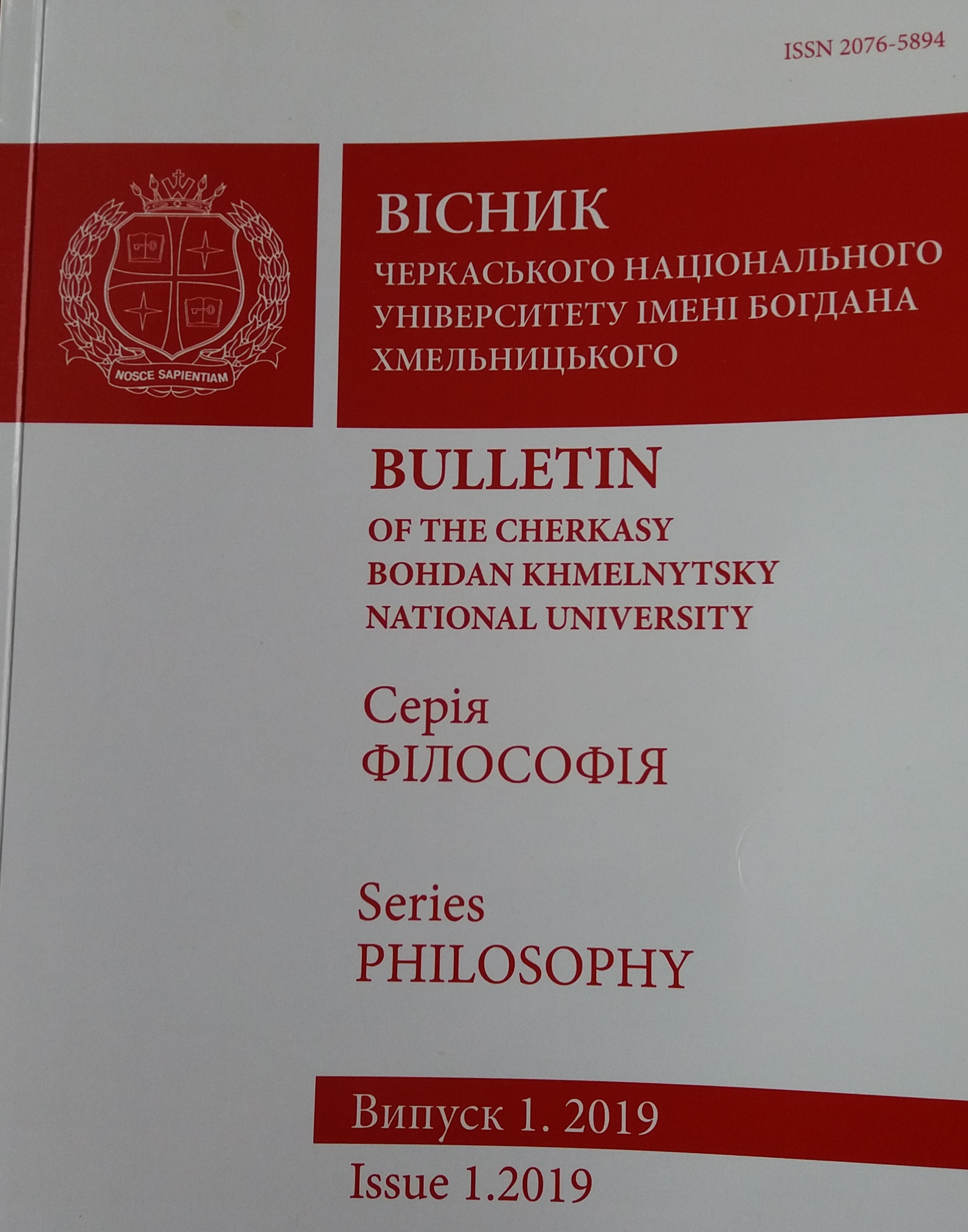CONCEPT OF «SYMPHONY» OF CHURCH AND STATE AS A BASIS FOR ORTHODOX CAESAROPAPISM
Main Article Content
Abstract
Summary. Introduction. The article substantiates causal relations between the theory of "symphony" of the Church and the State proposed by Emperor Justinian, and appearance of specific relationships expressed in the primacy of political power over the spiritual institution and known as "Caesaropapism". Examples of Caesaropapist relations between church and state in the Byzantine Empire, in the Kievan Rus, in the Moscow kingdom and Russia are depicted in the historical aspect.
Purpose. To explore the formation of Caesaropapism in the Orthodox world, as a result of the transformation "symphony of power" Emperor Justinian I.
Methods. Methods of analysis, description and induction were used to study the cause of Caesaropapism appearance, to display the most significant historical stages of its manifestation and to find out its consequences for the countries of the Orthodox world.
Results. It was found that the concept of "symphony" proposed by Justinian I was the basis for the formation of Caesaropapist relations and it was aimed not to the harmonious existence of spiritual and secular institutions but to the development of Byzantine absolutism in the base of which the Orthodox Church was supposed to lie. Subsequently, the Byzantine emperors used the legal work of Justinian I to justify their political dominance over the Orthodox Church. The Moscow version of Caesar's repentance manifests itself in a more perverted form and rather resembles the elements of theocracy being close to the Islamic world.
Originality. The study notes that the purpose of the Justinian the Great’s "symphony" was a desire to fix the unhindered intervention of secular authority in the affairs of the church at the legislative level, and this eventually led to the establishment and consolidation of Caesaropapism as a system of relations between political and spiritual authorities in the Byzantine Empire, and later, with borrowing Christianity, in the Russian Empire and in Russia too. It is noted that the manifestations of Caesaropapism are also evident in modern Ukraine which is a consequence of the influence of the Russian Orthodox tradition.
Conclusion. So, the symphony of Emperor Justinian the Great became the source of Caesaropapism, and it legislatively provided the influence of basileus on the Orthodox Church. Cesaropapism became a characteristic phenomenon for both Byzantium and for the Russian Empire. Intervention of political elites in the spiritual sphere takes place also in modern Ukraine, as our country is still experiencing the consequences of political and spiritual Russian hegemony.
Article Details
References
Migunova, T. L., Romanovskaya, L. R. (2013). «The Symphony of Authorities» as a principle of relations between the Сhurch and the Sstate. Vestnik Nizhegorodskogo universiteta im. N. I. Lobachevskogo (N. I. Lobachevsky Nizhny Novgorod University Bulletin), 3 (2), 147-150 (in Russ.)
Bolotov, V. V. (1913). Lectures on the History of the Ancient Church, 3. Saint Petersburg: M. Merkushev Publishing House (in Russ.)
Pavlov, A. S. (2002). The course of Church Law. Saint Petersburg: Lan’ (in Russ.)
Kartashev, A. V. (2002). Ecumenical Councils. Klin: Fund «Christian Life» (in Russ.)
Baluh, V. O. (2006). Byzantine Studies: Course of lectures. Chernivci: Kniga – ХХІ (in Ukr.)
Men, A. (1997). History of Religion, 1-2. Moscow: Forum-Infra-M. Retrieved from https://religion.wikireading.ru/70287 (in Russ.)
Sokolov, S. (2007). History of Eastern and Western Christianity (IV-XX centuries). Moscow: Moscow Institute of Spiritual Culture (in Russ.)
Sokolov, I. I. (2005). Lectures on the History of the Greek-Oriental Church, 1-2. Saint Petersburg: Oleg Obyshko Publishing House (in Russ.)
Vasilev, A. A. (1998). The history of the Byzantine Empire, 1: Time to the Crusades (up to 1081 year). Saіnt Petersburg: Aletejya (in Russ.)
Vasilev, A. A. (1998). The history of the Byzantine Empire, 2: From the beginning of the Crusades to the fall of Constantinople. Saint Petersburg: Aletejya (in Russ.)
Bezobrazov, P. V. (1919). Essays on Byzantine Culture. Petrograd: Ogni (in Russ.)
Ilin, I. A. (1994). Collected Works, 4: The concepts of law and power. Moscow: Russian Book (in Russ.)
Barabash, A. S. (2005). The nature of the Russian criminal procedure, the objectives of criminal procedure and their establishment. Saint Petersburg: R. Aslanov «Legal Centre Press» (in Russ.)
Вabenko, V. M. (2017). Worldview Fundamentals of Breaking Relationships between the Church of Moscovy and the Kyiv Metropolitanate. Liudyna, suspilstvo, komunikatyvni tekhnolohii: materialy V Mizhnarodnoi naukovo-praktychnoi konferentsii (Man, society, communicative technologies: materials of the V International Scientific and Practical Conference), 114-118. Harkiv-Liman: Krasnolimansk Branch of Institute of Philosophy of NAS of Ukraine (in Ukr.)
Kortunov, S. V. (2009). The formation of national identity: What Russia needs the world. Moscow: Aspect Press. Retrieved from https://textbooks.studio/teoriya-politiki-uchebnik/stanovlenie-natsionalnoy-identichnosti-kakaya.html (in Rus.)
Efimovskij, V. L. (2013). Priesthood and the kingdom: on the model of state-relations in the Moscow period. Vestnik Рermskogo universiteta (Perm University Bulletin), 1(19), 38-45 (in Russ.)
Fortunatov, V. V. (2009). Who and where is leading Russia? From Charisma to senility. Saint Petersburg: Piter (in Russ.)
Tregub, G. (2018). About what Leviathan does dream? Ukrayinskij tizhden (Ukrainian Week),4 (531). Retrieved from https://tyzhden.ua/Politics/208318 (in Ukr.)
Sсhotkina, K. (2004). His Beatitude Lubomyr Husar: On Hope and Mission. Analitichnij tizhnevik «Dzerkalo tizhnya» (Analytical weekly "Mirror of the Week"), 7. Retrieved from https://dt.ua/SOCIETY/blazhennishiy_lyubomir_guzar_pro_nadiyu_i_misiyu.html (in Ukr.)

